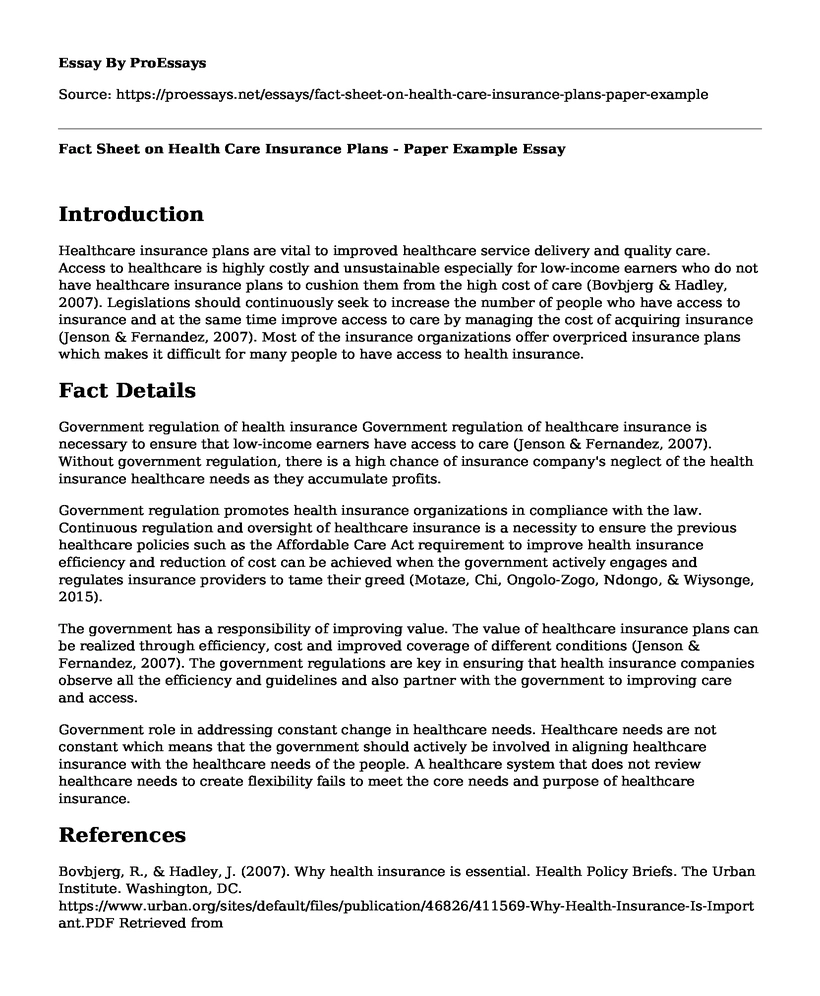Introduction
Healthcare insurance plans are vital to improved healthcare service delivery and quality care. Access to healthcare is highly costly and unsustainable especially for low-income earners who do not have healthcare insurance plans to cushion them from the high cost of care (Bovbjerg & Hadley, 2007). Legislations should continuously seek to increase the number of people who have access to insurance and at the same time improve access to care by managing the cost of acquiring insurance (Jenson & Fernandez, 2007). Most of the insurance organizations offer overpriced insurance plans which makes it difficult for many people to have access to health insurance.
Fact Details
Government regulation of health insurance Government regulation of healthcare insurance is necessary to ensure that low-income earners have access to care (Jenson & Fernandez, 2007). Without government regulation, there is a high chance of insurance company's neglect of the health insurance healthcare needs as they accumulate profits.
Government regulation promotes health insurance organizations in compliance with the law. Continuous regulation and oversight of healthcare insurance is a necessity to ensure the previous healthcare policies such as the Affordable Care Act requirement to improve health insurance efficiency and reduction of cost can be achieved when the government actively engages and regulates insurance providers to tame their greed (Motaze, Chi, Ongolo-Zogo, Ndongo, & Wiysonge, 2015).
The government has a responsibility of improving value. The value of healthcare insurance plans can be realized through efficiency, cost and improved coverage of different conditions (Jenson & Fernandez, 2007). The government regulations are key in ensuring that health insurance companies observe all the efficiency and guidelines and also partner with the government to improving care and access.
Government role in addressing constant change in healthcare needs. Healthcare needs are not constant which means that the government should actively be involved in aligning healthcare insurance with the healthcare needs of the people. A healthcare system that does not review healthcare needs to create flexibility fails to meet the core needs and purpose of healthcare insurance.
References
Bovbjerg, R., & Hadley, J. (2007). Why health insurance is essential. Health Policy Briefs. The Urban Institute. Washington, DC. https://www.urban.org/sites/default/files/publication/46826/411569-Why-Health-Insurance-Is-Important.PDF Retrieved from
Jenson, J., & Fernandez, B. (2007). Health Insurance Basics: Roles for the Market and Government in Providing, Financing, and Regulating Private Insurance Coverage. Federal Publications, 475. Retrieved from https://digitalcommons.ilr.cornell.edu/cgi/viewcontent.cgi?referer=https://www.google.com/&httpsredir=1&article=1480&context=key_workplace
Motaze, N. V., Chi, C. P., Ongolo-Zogo, P., Ndongo, J. S., & Wiysonge, C. S. (2015). Government regulation of private health insurance. The Cochrane database of systematic reviews, (4). Retrieved from https://www.ncbi.nlm.nih.gov/pmc/articles/PMC4441071/
Cite this page
Fact Sheet on Health Care Insurance Plans - Paper Example. (2022, Dec 05). Retrieved from https://proessays.net/essays/fact-sheet-on-health-care-insurance-plans-paper-example
If you are the original author of this essay and no longer wish to have it published on the ProEssays website, please click below to request its removal:
- Asthma in Hispanic Children Essay Example
- The Importance of Food Accessibility for the Poor Communities Essay
- Essay Sample on Abortion Clinic Access
- Essay Example on Daily Coffee Drinking: A Need or a Habit?
- Ensuring Quality, Safety & Privacy: HIPAA & HITECH in Healthcare - Research Paper
- Essay Example on Gallbladder Disorders: Prevalence & Diagnosing With Ultrasonography
- Essay Example on Sports Injuries: A Closer Look at Their Psychological Effects.







